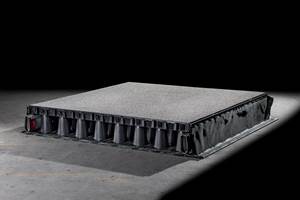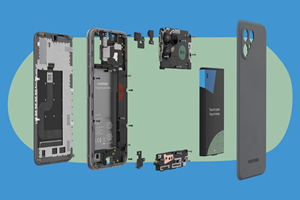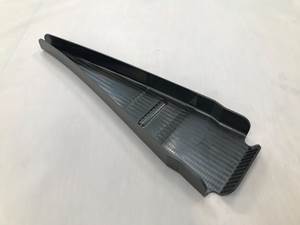USPTO issues patent for fully circular thermoset resin, stems from UC Santa Barbara Research
Fully cured thermoset resin solubilizes on demand and under benign conditions, allowing for up to 100 wt% recovery of fibers in composites, including carbon fiber. The circularity is driven by a bio-based alternative to BPA.
Share
Source | Reprinted with permission from Macromolecules 2018, 51, 9816–9824. Copyright 2018 American Chemical Society.
On Feb. 6, 2024, the USPTO (Alexandria, Va., U.S.) issued Patent No.: US 11,891,473 B2 for “Decomposable and Recyclable Epoxy Thermosetting Resins.” Technology referenced in the patent stems from research conducted by Dr. Mahdi Abu-Omar, professor and Mellichamp Chair of Green Chemistry in the Chemistry and Biochemistry Department at the University of California, Santa Barbara (UCSB). The patent is assigned to The Regents of the University of California (Oakland, Calif., U.S.). The research was funded by the U.S. Department of Energy (DOE).
In peer-reviewed research, the novel epoxy resin demonstrates full solubility on demand without complicated or high energy processing and maintains the original thermoset mechanical properties and characteristics when reformed through multiple recycles.
Published results showed the cured EN-VAN-AP to have comparable mechanical properties, water resistance and solvent resistance to a BPA-based thermoset prepared using the same crosslinking conditions. The cured epoxy network can be dissolved in a solution of hydrogen chloride (HCl) in water as well as other solvents containing HCl.
The IP also leverages a new bio-based alternative to BPA to drive its circular capabilities — eliminating thermosets as a source of BPA into the environment. Circularity is therefore on the resin side versus the curing agent.
How is the EN-VAN-AP synthesized? After vanillin (VAN) and aminophenol (AP) are reacted in water at room temperature to create the BPA alternative, VAN-AP (an imine-embedded bisphenol), it is reacted with epichlorohydrin to make glycidyl ether resin, GE-VAN-AP. This resin can then be reacted with any commercially available hardener to make the fully cured epoxy network, EN-VAN-AP. As such, the material manufacturing has “drop-in” potential with respect to conventional thermoset production.
In emphasizing its impact for composites, Professor Abu-Omar states: “This breakthrough enables us to recycle carbon fiber composites sustainably, preserving the integrity of both the fiber and polymer matrix, turning waste into reusable materials while reducing environmental impact.”
According to research, the depolymerization process can yield up to 100 wt% of the resin as a gel and the fiber reinforcements — including carbon fiber. At end of life, waste material could reportedly be turned into new composite parts, eliminating millions of tons of waste to landfills and incinerators each year.
The technology joins several other recent advancements in circular capabilities for thermoset resins, with specific advantages being its full circularity and its solubility under mild and low-energy conditions.
“Obviously there is a lot of attention and urgency being placed on sustainability, but also a lot a variation as to what that means — reuse versus recycling versus repurposing and so on,” says John Casko, principal at BFS Workhorse Consulting LLC. “This is breakthrough technology in that it is 100% full circle. The materials can be recovered in their original form and reused for their original purpose, and that the depolymerization process requires very little energy nor other complex processing, making it practical.”
“There is potential to establish a bio-based alternative to BPA as a platform that can bring circularity to all of the thermoset resins market,” Casko continues. “Beyond that, the technology could revolutionize traditional thermoplastic applications by bringing the known strengths of thermosets without sacrificing the expected and required recyclability. So, we are looking at platform shifts across large markets and a significant position of industry leadership for the right commercialization partner or partners.”
UCSB and BFS Workhorse Consulting LLC have contracted under a novel deal structure that enables sublicensing of university IP by the licensee (BFS Workhouse) as the primary means for commercialization of the technology. The technology is currently available for sublicensing.
Technical or commercial inquiries can be directed to John S. Casko Jr., BFS Workhorse Consulting LLC, at jcasko@bfsworkhorse.com or by call, text or voicemail to 319-331-1995 (cell).
Related Content
CirculinQ: Glass fiber, recycled plastic turn paving into climate solutions
Durable, modular paving system from recycled composite filters, collects, infiltrates stormwater to reduce flooding and recharge local aquifers.
Read MoreComposites end markets: Electronics (2024)
Increasingly, prototype and production-ready smart devices featuring thermoplastic composite cases and other components provide lightweight, optimized sustainable alternatives to metal.
Read MoreWatch: A practical view of sustainability in composites product development
Markus Beer of Forward Engineering addresses definitions of sustainability, how to approach sustainability goals, the role of life cycle analysis (LCA) and social, environmental and governmental driving forces. Watch his “CW Tech Days: Sustainability” presentation.
Read MoreASCEND program update: Designing next-gen, high-rate auto and aerospace composites
GKN Aerospace, McLaren Automotive and U.K.-based partners share goals and progress aiming at high-rate, Industry 4.0-enabled, sustainable materials and processes.
Read MoreRead Next
Biomaterials make strides toward composites sustainability
A compilation of trends in development or application of natural fibers, bio-based resins and more showcases industry players, educational institutes and global projects.
Read MoreNREL develops biomass-derived resin PECAN for wind blades
Demonstration and findings validate PECAN as a method for developing long blades that perform well with composites, outperform some resins and enable chemical recycling.
Read MoreMagnetic nanoparticles show promise for thermosets recycling
Aitiip and the University of Slovenia have collaborated to develop, test and prove how smart magnetic nanoparticles can produce a controlled decomposition of the resin for recycling.
Read More










